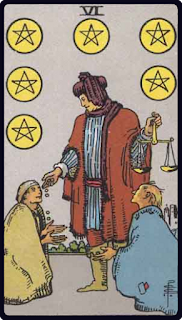
Representing transience and movement; the 6 of Pentacles represents a return to balance, a recognition within those who can, that they have an obligation to those who cannot. The 6 of Pentacles reinforces the connected nature of wealth and the limit of that abundance. You can only take so much before you can take no more, you can’t get blood from a stone. When all sacrifices have been made, those who depend upon the sacrifice of others face destruction and destitution.
Whilst this relationship and inevitable destruction is often focused upon the poor, the risk of destruction does not truly lie with them but with the rich. Poverty poses no threat to those who are already poor; those who horde wealth and plan growth of their wealth on the premise of continued sacrifice will face their downfall when the limit of that sacrifice is met.
In the upright state the 6 of Pentacles represents the movement of wealth and the correction of imbalance. Those who have horded their wealth will experience loss, and those who have gone without will be repaid. This repayment will come by force, as the material realm tends towards balance and equilibrium, those who create imbalance are not above its ire.
In the inverted state the 6 of Pentacles represents the stagnation of wealth as a means to restore balance. Here growth will be disproportionate and favour those with less, punishing those with more.
In the Rider-Waite deck the rebalancing of wealth is depicted by a man standing with a set of golden scales in his left hand representing the sinister nature of the material realm and its indifference to the feelings of those who horded wealth; from their right-hand golden coins fall into the hands of one of two beggars who kneel before him. The right hand representing the just nature here reinforces the distinction between justification and the perceived notion of justice as represented by the left hand in the literal sense of the Justice card of the Major Arcana.
Above the man there are 6 golden Pentacles split into 3 columns, to the left three pentacles echo the 3 of Pentacles, stacked above the head of the beggar to the left of the card receiving their donation here connection is reinforced; above the second beggar to the right of the card the 2 of Pentacles is echoed, with the scales reinforcing the symbolism of balance. Above the man a single pentacle echoes the Ace of Pentacles representing potential and new commitments.
In self-reflection the 6 of Pentacles serves as an opportunity to consider what is dynamic, what has changed in our environment or even what has changed within ourselves. As mentioned before, our knowledge and experience gained over time, coupled with our memory serve as examples of intangible wealth; these are things that have value but are hard to cost (difficult to put a price on), and typically do not have a physical manifestation that we can touch. This is where keeping track of our physical and mental health over time can help us identify intangible benefits that have physical repercussions.
Not all movement is bad, the direction of movement is more important than the act of moving in itself. Recognising the benign changes in our environment can help us identify trends and learn in advance what potential impact those changes could have. Planning for the future helps eliminate uncertainty but that can be difficult particularly if that future involves situations we have not encountered before or that are completely unknown and unforeseen – for example having a child for the first time involves a vast amount of uncharted territory you will have to navigate.
Ask yourself “What is changing?” and take the opportunity if needed to revisit the Ace of Pentacles and the efforts that you made to document your environment. Identifying where you are, and where you were, can help draw a vector (direction of travel) to analyse where you might be going. It can also be the case that we feel as though nothing in our lives has changed but upon deeper reflection that might not be the case – internal movement defined as changes in perspective, experience, knowledge, and other quantifiable changes can often be imperceptible on a surface level.

No comments:
Post a Comment
All comments are moderated before they are published. If you want your comment to remain private please state that clearly.